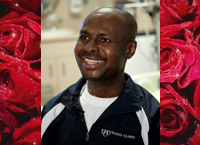

 Heart & Kidney Recipient Sponsored by Mayo Clinic Transplant Center |
|
|
After Charles Okeke's first heart transplant went into failure, he thought he might never receive another. To buy time, Charles received an artificial heart powered by a 400-pound driver. Because of the cumbersome size of the device, Charles remained in the hospital more than two years until he became the first patient in the U.S. to have a 13-pound portable version, allowing him to go home and resume life with his family. Less than one year later, against great odds Charles received a new heart and kidney. "There are no words to express my appreciation and respect for the family that made the courageous and generous decision to donate their loved one's organs – and my new heart," said Charles. Charles's Story Charles Okeke admits that it wasn't easy to come to terms with the cruel reality that he might not live past forty. His first heart attack happened at age 30, and as a result he had to have a heart transplant. His first gift of life lasted 10 years until 2008, when his transplanted heart went into failure. "A second heart transplant was out of the question," said Charles, "but Mayo Clinic in Arizona did not give up on me." Charles was outfitted with a total artificial heart, meaning they removed his own heart and implanted the artificial one. The device was powered by a 400-pound driver nicknamed "Big Blue" that kept Charles's blood circulating, just like a human heart would. However, because of the cumbersome size of the device, it meant that Charles had to remain in the hospital for more than two years. Charles's sense of humor shone through when he responded to people asking if he felt like he was in prison. "I confessed that yes, I did, but with very nice guards." On May 3, 2010, however, on a milestone day for the Mayo Clinic, Charles became the first patient in the U.S. to have "Big Blue" swapped for a 13-pound, portable version, allowing him to go home with the 'backpack' sized power source to keep his heart going. That changed everything, and Charles was able to resume life with his wife, Natalie, and their three children. "I was about as happy as a man could be," recalled Charles. A national TV network was there to capture the moment he left Mayo Clinic Hospital, surrounded by many of the wonderful people who participated in his care over the years. The device was intended to serve as a 'bridge to transplant.' However, because of a complex situation in which Charles's body produced antibodies that made it difficult to find a matching donor heart, no one could predict how long it would be – or if he would qualify for a heart transplant at all. Then, in a development that many considered to be against all odds, Charles received the startling news that he was going to be the recipient of a matching donor heart – and a kidney. Those surgeries took place in January 2011. "There are no words to express my appreciation and respect for the family that made the courageous and generous decision to donate their loved one's organs – and my new heart," said Charles. "It was such a happy day for me, and I can only imagine what a bad day it was for them. I honor them and I am keeping my pledge to continue honoring and taking care of this great gift of a heart." |
